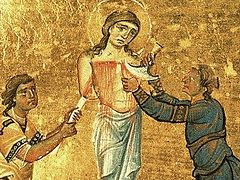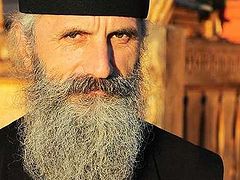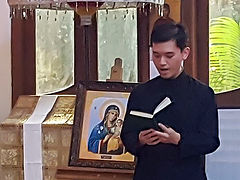Fr. John Lincoln Downie was born in 1971 in Beaver Falls, Pennsylvania. In 1992, he graduated from the Christian Geneva College in the same state (the Biology and Philosophy Department). He spent two years at the Koutloumousiou Monastery on Mt. Athos (1999—2001), where he was received into Orthodoxy through Baptism. Then Fr. John studied at the Department of Orthodox Theology at Bucharest University (2001—2006), where he defended his thesis on the subject, “The Doctrine of Creation According to Fr. Dumitru Staniloae”, getting a Master’s Degree in Biblical Theology. He currently serves as an Orthodox priest in Romania. This interview was conducted before Fr. John’s ordination.
—Mr. Downie, what can you tell us about your childhood and the religion you were raised in?
—I spent my childhood in a small town in Pennsylvania. I was born to Reformed Presbyterian parents and went to a private Protestant school. My childhood was almost idyllic. There were five of us siblings, and I was the youngest. We got along with each other, though we were very different. We were a quiet Protestant family.
As a college student I became a “rebel”. And I cannot say that my protest was always bad. I protested against what is called “success” in American society and against materialism which now was permeating the whole of America.
—How did you discover Orthodoxy?
—Sometimes I feel as if I can speak of my journey to the Orthodox Church for a whole week, but I will try to be brief. A knowledgeable man of broad views, my father saw it was difficult for me to choose my way in life. He also noticed that I took interest in the writings of the Church Fathers (Sts. Athanasius of Alexandria, Ignatius of Antioch) and The Church History by Eusebius of Caesarea—the books he had brought home as if by chance.
He also gave me one book on Orthodoxy by one Protestant author to read. I found that book very interesting and its contents quite accurate. It was entitled, Eastern Orthodoxy—a Western Perspective. Although it had a number of errors in the interpretation of Orthodoxy, this book sparked my interest in the nearest Orthodox convent. It was founded by a Romanian priest, Fr. Roman (Braga)1, and Princess Ileana of Romania (also known as Mother Alexandra)2.
As soon as I entered an Orthodox church for the first time, I felt an atmosphere of deep peace and “magnetism” that reigned there. From that moment on I had a profound respect for the Orthodox Church and saw, though still not clearly, a great difference between the Orthodox and the Catholic Churches.
Little by little, within two or three years, I simply fell in love with Orthodox church services and felt a strong desire to try and live the monastic life, if only a little. On the one hand, I was still immature at that time; and, on the other hand, my family and friends were Protestants and Catholics, while deep in my heart I felt that I was Orthodox.
Fascinated by monasticism I travelled to Mt. Athos in the hope of deepening my spiritual life. There I was encouraged in my urge by Athonite monks who inspired me to get baptized. I had been baptized as a Protestant in my youth, but when I wished to embrace Orthodoxy in America, I was told that I could be received only through Chrismation by economy [also called “oikonomia”—the principle of pastoral condescension in the Church.—Trans.]. That point was crucial for me, so I finally decided to join Orthodoxy through Baptism.
I stayed at Koutloumousiou Monastery, where I was a “dokimos” (a newcomeer who undergoes a period of testing as a postulant). The fathers baptized me right in the sea, in the place called Kaliagra, which means “a good spot for fishing”.
What can I say? Truly, monks are holy men. It was very sad to part with them, but I didn’t feel prepared for real monastic life on Mt. Athos. Now I hope and pray that the Father, the Son, and the Holy Spirit can have mercy on me and allow me to taste that grace and peace once again before I depart this life.
I confess that after being baptized on Holy Mount Athos I felt as if I were in heaven for an entire week. I humbly ask you to pray for me because at present I am far from feeling that grace.
—What can you say about your conversion?
—I believe in a continuous conversion. It lasts a lifetime. It is the very process of transition from death to life. I feel I could follow this path forever and ever. I have done so much, working in partnership with Divine grace, so that God could help me make the decision to embrace Orthodoxy!
But have I really become truly Orthodox? Looking at my life, I don’t think I can call myself Orthodox. I believe in everything, but only with my mind, whereas my heart is still far from God. And is someone whose heart is cold and not enlightened by grace really Orthodox? I pray that I can be wholeheartedly converted before I die.
To be more specific, when I came to understand prayer and began to pray more, I realized that Orthodox tradition has preserved the deepest possible experience of prayer. In contrast with other Denominations, Orthodox faith alone proclaims that God became man so that man might become god; it professes that a theologian is one who prays truly; it teaches that we must free ourselves from our own prejudice towards God to become closer to Him; and that the mind must be united with the heart.
All of this is clearly based on the Holy Scriptures, and from a historical viewpoint only the Orthodox Church has maintained this tradition without distorting it.
—Did your visit to Mother Alexandra’s Convent [the Romanian Transfiguration Convent at Elwood City, PA.—Trans.] prompt you to study Romanian Orthodoxy? How did you end up in Romania?
—That is another complex question, and it would take me hours to cover it. But I will be brief again. During my stay in Greece I met several Romanians and felt an urge to visit Romania or even go and study theology there. I was shocked by the suffering the Church had endured under Communism, and I desired to draw closer to real saints. I had heard about Fr. Cleopa (Ilie), Fr. Sofian (Boghiu), and Nicolae Steinhardt3 — true Christians.
—What do you think of the current state of affairs in Romania?
—I was very welcome at the Department of Theology. I spent my first year at the dormitory, and all of my colleagues were up to scratch—since then I have never met any other Romanians with whom I shared so many fried potatoes… Those people helped and inspired me so much. I cannot describe in words what I felt realizing that my teachers were the professors whose spiritual fathers had languished in jail for their love for Christ. I felt great admiration for them.
I saw Fr. Sofian and spoke with Elder Justin (Parvu) a little. The spiritual fathers of some of my teachers were Fr. Dumitru (Staniloae) and Fr. Sofian.
Sometimes it makes me sad to see that people fail to understand that it is a great honor to have such holy men around you! Fathers Constantin (Galeriu), Dumitru (Staniloae), Sofian (Boghiu), Cleopa (Ilie), Ilie (Lăcătuşu)4, and Arsenie (Boca) are not dead—they are with God! I rejoice because they are saints and not because they are Romanians.
—Can we draw a parallel between American Christian society and the Romanian Orthodox world?
—I would not like to accentuate differences—human beings are the same everywhere, but I think it would be fair to say that Romania is spiritually rich, whereas America is spiritually poor. Materialism thrives and flourishes in America. You are not allowed to talk about Jesus Christ in public schools there. If anyone in America wishes to find Christ, there are thousands of ways of getting lost and ending up in a wrong place.
The idea of “financial success” is very tempting, but America’s business world is very atheistic. There is a dramatic irony here. There is great power there, an unpleasant way of thinking that has seized America—and that may turn out to be worse than Communism. The godless Communist ideology proclaimed: “There is no God, don’t believe in Him.” And modern America says: “Whether God exists or doesn’t exist—there is no problem. All religions are the same, what really matters is love. If you claim that your religion alone is correct, then you must be a bigot.”
Under Communism Christians were brutally persecuted, which indicates that the leaders of Communist countries were well aware of the power of religion. Making distinctions between faiths is forbidden in America, while the Government asserts that it is religiously neutral.
Now the Romanians are returning to God because they have nothing else. But they do have the most important thing! Soon Romania will face a real test: whether or not it will be able to preserve its Orthodox faith after joining the EU5.






